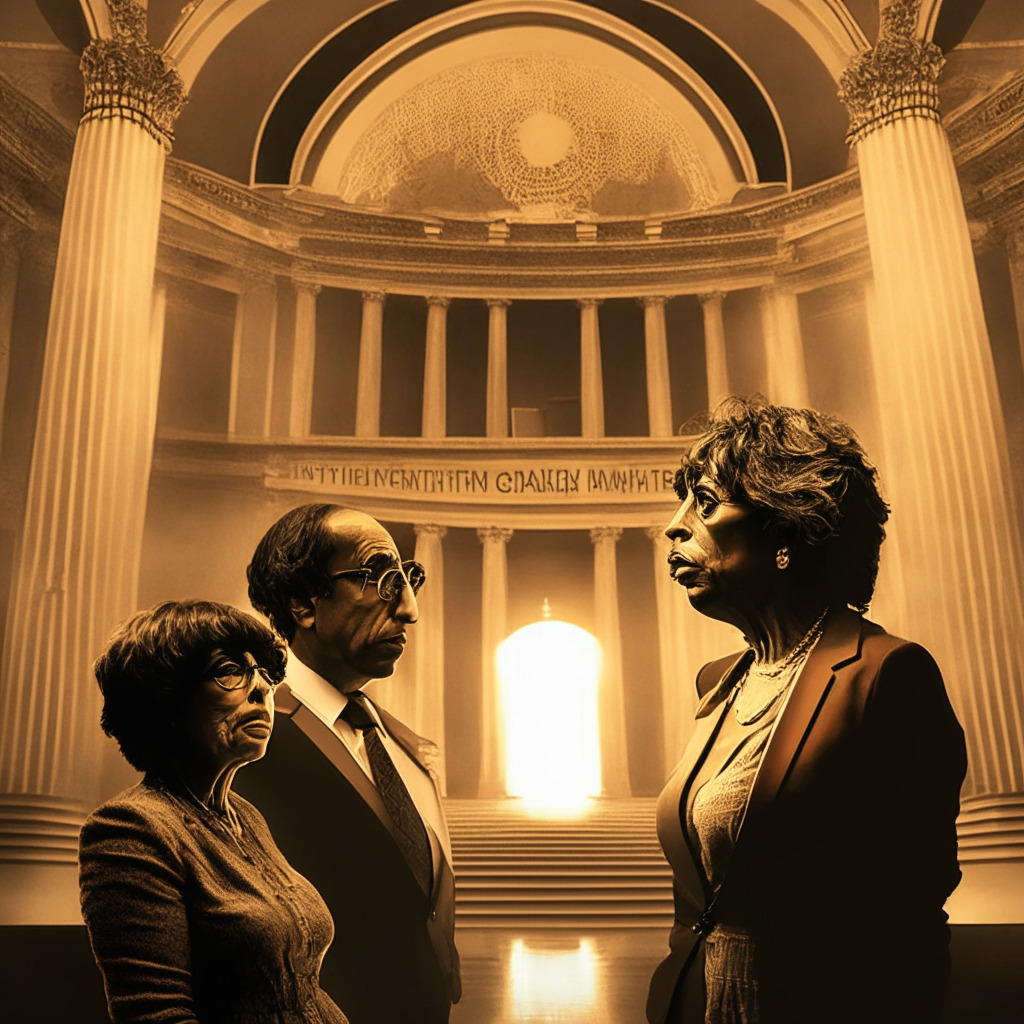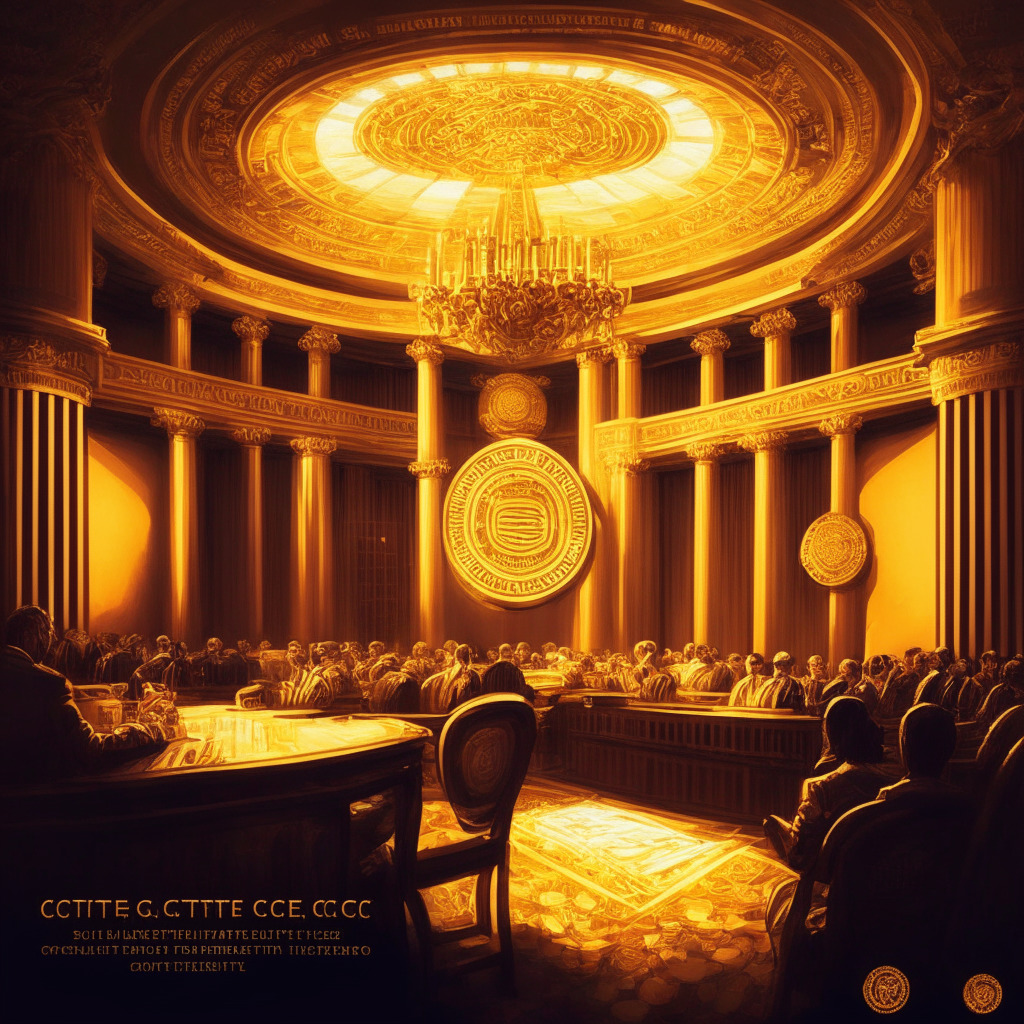This article discusses the current market structure discussion draft for crypto legislation, proposed by House Republican Committee leaders Patrick McHenry and Glenn Thompson. While it faces political challenges, it could serve as a foundation for future bipartisan crypto regulation.
Search Results for: Glenn Thompson
Navigating Crypto Legislation: Can the New U.S Federal Regulatory Framework Provide Clarity?
“The Financial Innovation Technology for the 21st Century Act, aimed at establishing a federal regulatory framework for cryptocurrency, has been forwarded to the full House of Representatives. This addresses the current industry confusion caused by a lack of explicit regulations, by providing clarified guidelines for crypto ventures.”
Assessing the Impact of Newly Proposed US Blockchain Regulation Bill
Senior House Republicans proposed a bill called the “Financial Innovation and Technology for the 21st Century Act.” The legislation aims to define “blockchain” and “digital asset” in financial laws, clarify the roles of the CFTC and SEC in cryptocurrency oversight, and establish clear guidelines for classifying digital assets. Despite some opposition, it has substantial backing due to its dual objective of consumer protection and promoting innovation.
Crypto Bill Debate: Balancing Investor Protection and Market Innovation
Rep. Maxine Waters seeks input from the US Treasury Department and the SEC on the potential impact of the latest crypto bill proposed by Republicans. She questions the bill’s effectiveness in protecting investors, changing the roles of the SEC and Treasury in the crypto market, and its possible threat to financial market stability. The outcome could significantly shape the future of crypto businesses and industry-wide regulations.
Digital Asset Market Structure: A Path for Crypto Regulation or Hindrance to SEC’s Authority?
House Financial Services Committee Chair Maxine Waters proposed the Digital Asset Market Structure bill, offering US-based digital asset exchanges a pathway for SEC registration, seeking regulatory clarity for the crypto industry. The legislation aims to approve digital securities, commodities, and stablecoins for trading while providing guidelines to distinguish between crypto-based securities and commodities.
Navigating the Turbulent Waters of Crypto Regulation: Challenges and Prospects
Congress’ latest proposed crypto bill seeks to resolve the “haphazard, schizophrenic” ways of regulators addressing significant industry players. The bill faces challenges in securing passage and has received mixed reactions from policymakers. However, the bipartisan nature of the issue provides hope for progress in clarifying regulatory expectations.
Cryptocurrency Clarity: June 13 Hearing, Regulation, and Market Impact
The upcoming U.S. House Financial Services Committee hearing on June 13 could bring clarity to the cryptocurrency market, addressing regulatory compliance, investor protection, and market stability. Proposed legislation may regulate crypto assets and exchanges, stabilizing markets and fostering industry advancements. Investors are eyeing various cryptos amidst these developments.
Janet Yellen’s Support for Crypto Regulation: Balancing Investor Protection and Industry Growth
US Treasury Secretary Janet Yellen supports SEC and CFTC enforcing cryptocurrency regulations for consumer protection. However, critics argue over-regulation may stifle innovation. With Congress yet to pass crypto legislation, the industry faces ongoing uncertainty surrounding the appropriate level of regulation.
Upcoming US Financial Services Committee Hearing on Digital Assets: What to Expect
The United States Financial Services Committee has scheduled a hearing on June 13 titled “The Future of Digital Assets: Providing Clarity for the Digital Asset Ecosystem.” It aims to discuss critical issues concerning digital assets and provide clarity for the crypto community.
Upcoming Hearing on Digital Assets: Balancing Clarity, Regulation, and Innovation
The House Financial Services Committee has announced a hearing on June 13th, titled “The Future of Digital Assets: Providing Clarity for the Digital Asset Ecosystem.” Amid an SEC crackdown, Republican lawmakers propose a draft bill for clearer crypto guidelines, seeking a balance between investor protection and innovation in the rapidly evolving digital asset ecosystem.
Crypto Regulation Debate: Balancing Market Stability and Innovation Amid SEC Lawsuits
The House Agriculture Committee’s recent hearing on crypto spot market regulation highlights the need for clear industry regulations. CFTC Chair Rostin Behnam emphasized crypto token classification, regulatory clarity, and concerns over financial instability. The SEC’s charges against Binance and Coinbase further underline the urgent need for a proper regulatory framework to protect investors and promote innovation.
Crypto Titans and Regulators to Debate New Bill in Congress: Impact on US Innovation
Coinbase, Robinhood, and US commodities regulator representatives will testify before Congress on June 6 regarding a proposed crypto bill. The bill aims to classify certain crypto tokens as digital commodities and provide a clearer regulatory framework. Coinbase Chief Legal Officer Paul Grewal emphasized its importance for protecting consumers and fostering crypto innovation in the US.
Proposed Crypto Bill: Balancing SEC Power and Fair Regulation in Digital Asset Industry
A drafted crypto bill proposed by Republican lawmakers aims to establish a clear framework for digital assets and hold regulatory bodies like the SEC and CFTC accountable for their actions, potentially changing the way digital assets are regulated. The bill could encourage fair enforcement practices, ensure consumer safety, and support innovation within the cryptocurrency markets.
Navigating the Pros and Cons of the U.S. House Republicans’ New Crypto Oversight Bill
“The Financial Innovation and Technology for the 21st Century Act by U.S. House Republicans aims to provide a sound regulatory framework for crypto investors protection. The bill seeks to establish clear regulatory principles balancing progressive tech with protective legislation, which, if successful, may streamline the fragmented regulation landscape in the U.S. and serve as a global blueprint.”
Landmark Bill on Crypto Tokens Exemption: Boon or Bane for Securities Laws and Investors?
The McHenry-Thompson draft bill aims to exempt cryptocurrency tokens from securities laws by creating a new asset class labeled “digital assets.” While it gains attention and support, the bill raises concerns regarding regulatory arbitrage and presents challenges reconciling the crypto industry’s goals with existing legislation, causing uncertainties for companies and investors.
US House Agriculture Committee Hearing: Balancing Crypto Regulation and Innovation
The US House Agriculture Committee’s hearing, “The Future of Digital Assets: Providing Clarity for Digital Asset Spot Markets,” aims to discuss legislation for regulating cryptocurrencies, with important figures like CFTC Chairman Rostin Behnam and Coinbase Chief Legal Officer Paul Grewal testifying. Balancing strict regulations and fostering innovation remains a challenge in shaping the digital asset industry’s future.
Bipartisan Efforts for Clear Digital Asset Regulations: Can SEC and CFTC Find Common Ground?
Two Republican lawmakers from the US House Financial Services Committee and the House Agriculture Committee are working on a discussion draft to regulate digital assets, aiming to establish clarity in determining when a digital asset is considered a security. The draft legislation, “Digital Asset Market Structure Discussion Draft,” proposes a process for treating digital assets and seeks a unified path for SEC and CFTC jurisdictions.
Digital Asset Regulation: Bridging the Divide Between CFTC and SEC in Upcoming Congressional Hearing
US lawmakers will discuss “The Future of Digital Assets: Providing Clarity for Digital Asset Spot Markets” in a congressional hearing on June 6. Collaboration between regulatory committees like the CFTC and SEC is essential to address concerns in the digital assets space, focusing on effective guidelines and fostering innovation while safeguarding consumer interests.

















